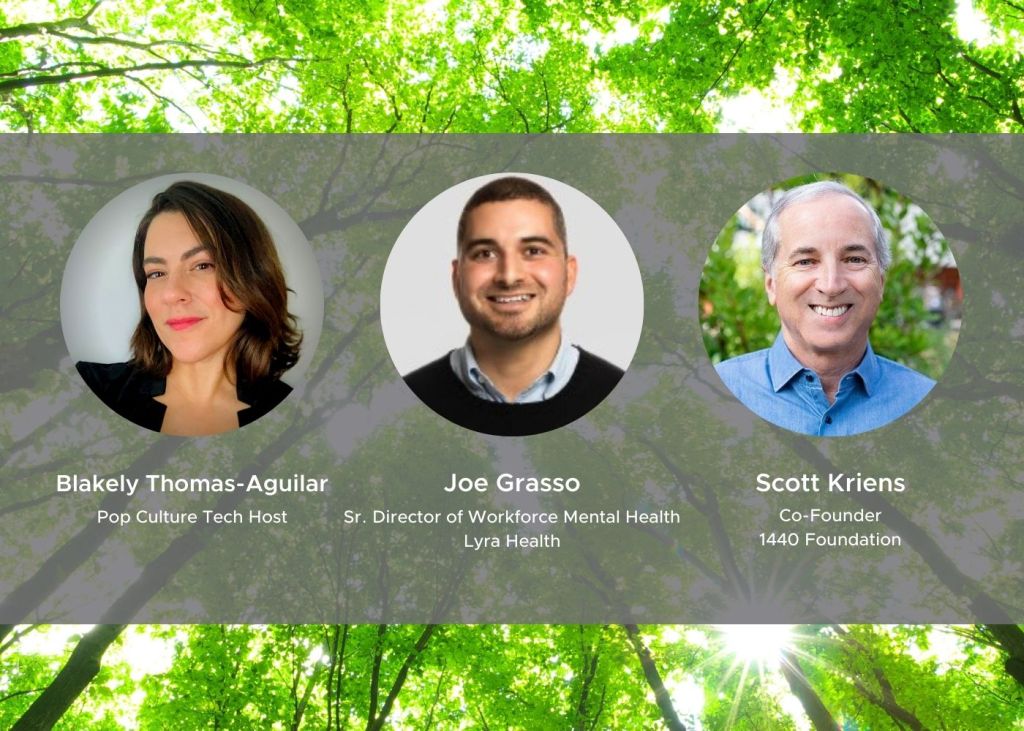What's In This Episode
- The wellness conversation
- Destigmatizing mental health
- Minimizing financial and physical care boundaries
- How tech is transforming connections
- Surface and meaningful exchanges
Listen In Your Favorite Podcast Player
Featuring (In Order of Appearance)

Shining a Light on Mental Health Struggles & Digital Services
A recent Kaiser Family Foundation study reveals almost half (45%) of Americans say the pandemic is harming their mental health.
The Washington Post
In contrast to localized disasters, the pandemic has impacted nearly everyone in the world. And that collective experience has empowered people to voice feelings that typically go unshared. Emotions ranging from isolation and loneliness to anxiousness and worry.
Today, not only friends and family but increasingly business leaders, politicians and sports champions—of note, former McKinsey senior partner and former chief economic and business advisor to the California governor, Lenny Mendonca, highly decorated Olympic swimmer Michael Phelps, tennis star Naomi Osaka and gymnastic great Simone Biles—speak publicly about mental health.
“There has never been a time in our history where mental health has been so prominent as a part of the collective conversation as it is now,” said Dr. Joe Grasso, clinical psychologist and senior director of Workforce Mental Health at Lyra Health.
“And there is fortunately some silver lining to come from COVID-19 in the form of de-stigmatizing (the) mental health struggle,” Grasso said.
In 2019, the World Health Organization labeled employee burnout a medical condition, noting that its cause is chronic workplace stress.
McKinsey Quarterly
From Empathy to Widely Available Services
Discussion around empathy as a critical leadership skill has risen. So, too, has action by company leaders to promote mental health benefits and get employees who want help, the care they need. When leaders address the subject, it gives others permission to join the conversation.
“The most powerful testimonials come from leaders who speak up and say, ‘I’ve used this benefit. I find it valuable because I also struggle.’ That really shifts a work culture,” said Dr. Grasso.
What successful people coming forward shows, Dr. Grasso found, is that “any of us might struggle, but all of us should consider mental health support from a professional.”
Addressing Real-World Concerns
Although attitudes are changing, there are still both financial and physical boundaries employees seeking care must overcome:
- Structural barriers: For example, people don’t know how to find a provider; can’t find a provider to meet a specific need; or don’t have the financial means to access a provider.
- Attitudinal barriers: For example, people’s negative feelings associated with mental health concerns and treatments due to perceived stigmas or external depictions of therapy.
“Both of these things can keep people from getting the care they need,” according to Dr. Grasso.
Companies like Lyra work hard to combat both concerns by teaming with organizations to offer mental health benefits to employees. And during COVID-19, this has included becoming even more digitally friendly.
The COVID-19 crisis has affected mental health services in 93% of countries.
The World Health Organization
Breaking Down Barriers With Technology
Human-to-human connection is the foundation for quality mental health care. Technology can simplify the process of making connections and facilitating on-going care.
Machine learning in the Lyra platform, for example, complements a self-completed care questionnaire to help match people seeking support to a subset of providers that are a best possible fit. It then goes a step further to offer employees a way to connect with providers—virtually or in person.
“What Lyra is trying to do is enhance the care experience with technology; not replace that human relationship,” according to Dr. Grasso.
Doing What’s Important for You
Hands-on approaches also are helping people heal and thrive. Husband and wife Joanie and Scott Kriens established the 1440 Foundation and 1440 Multiversity as a way of creating hope for living well.
Yet the idea’s seed was planted much earlier. During Scott’s tenure as chairman and CEO of Juniper Networks, his father passed away, “bringing to light the question of what really matters,” Kriens said.
Today, the 1440 Foundation helps people connect their passions and life’s work—in real, practical, felt experiences that people can carry back with them into the world.
“There is great beauty in being of service others,” Kriens said. “Yet I’ve learned that in service to others, it will be best done by also doing that which one is passionate about themselves.”
One of those areas for him is technology. During the pandemic, technology—even digital face-to-face communication—has proven critical for basic exchanges of information, he said. “Yet, it has also exposed the difference between that and what it means to share in-person energy. And when we do, don’t waste it,” he continued.
Tune into the “Heart, Mind, Soul” episode of the Pop Culture Tech podcast for more insights.
